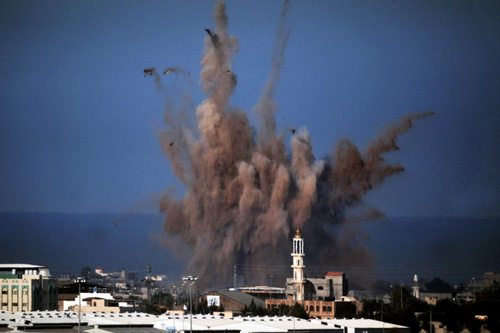
ChameleonsEye / Shutterstock.com
December 24, 2012; Source: Human Rights Watch
Just before Christmas, there was a spate of news coverage of a Human Rights Watch (HRW) report that criticized the Hamas authorities in Gaza for unlawfully firing 1,500 rockets at Israeli civilians during the November warfare. Human Rights Watch wrote that there was no legal justification for firing rockets at populated areas: “[D]eliberate attacks [on civilians and civilian structures] or attacks that do not discriminate between civilians and military targets” are prohibited under international humanitarian law or the laws of war. According to HRW Middle East Director Sarah Leah Whitson, “Palestinian armed groups made clear in their statements that harming civilians was their aim.”
HRW identified three armed groups that fired the rockets: the Popular Resistance Committee, Islamic Jihad, and Hamas, though Hamas, as the ruling authority, was “obligated to uphold the laws of war and should appropriately punish those responsible for serious violations.” The report added, “armed groups repeatedly fired rockets from densely populated areas, near homes, businesses, and a hotel, unnecessarily placing civilians in the vicinity at grave risk from Israeli counter-fire.” While it has been Hamas practice to launch rockets from sites near parks, schools, and residential areas, putting Palestinian civilians at risk from Israeli military counterattacks, it is also true that Gaza is a very small area. Containing more than 1.7 million people, it is only about twice the size of the District of Columbia, making it one of the most densely populated places in the world.
Sign up for our free newsletters
Subscribe to NPQ's newsletters to have our top stories delivered directly to your inbox.
By signing up, you agree to our privacy policy and terms of use, and to receive messages from NPQ and our partners.
The U.S. press typically doesn’t give that much coverage to Human Rights Watch reports, but this one defended Israel’s position after there had been significant coverage of Palestinian civilian casualties caused by Israel’s military response (some reports contended that the long-simmering conflict between Israel and Hamas had been exacerbated by Israel’s assassination of a senior Hamas military official). There is no defending the military practices of Hamas, but the U.S. press didn’t give nearly equivalent coverage to other Human Rights Watch reports released in the days just before the report condemning Hamas’ targeting of civilians.
A December 20, 2012 report by Human Rights Watch charged Israel with “four… attacks on journalists and media facilities in Gaza during the November 2012 fighting [that] violated the laws of war by targeting civilians and civilian objects that were making no apparent contribution to Palestinian military operations.” The attacks resulted in the death of two Palestinian cameramen and a two-year-old boy who lived across the street from the bombed media complex. Although Israel asserted that the media sites were legitimate military targets, on-site Human Rights Watch investigators didn’t agree. According to Whitson, “Journalists who praise Hamas and TV stations that applaud attacks on Israel may be propagandists, but that does not make them legitimate targets under the laws of war.”
A December 7, 2012 HRW report described an Israeli bombing of a Palestinian family’s home that killed 12 civilians, “a clear violation of the laws of war.” In this case, however, Israel contends that it is facing off against a Hamas organization that uses civilians as human shields and fires weapons from civilian locations.
Pro-Palestinian and pro-Israeli observers put differing emphases on the various Human Rights Watch reports. Regardless of one’s interpretations, the value of NGOs like Human Rights Watch is clear. HRW and others like it go into these dangerous situations and assess conditions fairly and impartially, carrying out an absolutely vital role that reflects a distinctive function of nonprofits as witnesses and truthtellers. Without groups like Human Rights Watch, the murky stories of charges and countercharges in the Gaza conflict are just about totally impenetrable from afar.—Rick Cohen













